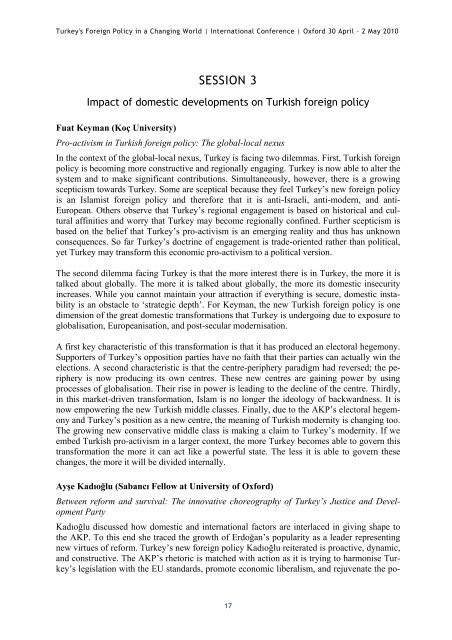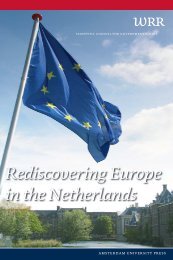Turkey's Foreign Policy in a Changing World - St Antony's College ...
Turkey's Foreign Policy in a Changing World - St Antony's College ...
Turkey's Foreign Policy in a Changing World - St Antony's College ...
You also want an ePaper? Increase the reach of your titles
YUMPU automatically turns print PDFs into web optimized ePapers that Google loves.
<strong>Turkey's</strong> <strong>Foreign</strong> <strong>Policy</strong> <strong>in</strong> a Chang<strong>in</strong>g <strong>World</strong> | International Conference | Oxford 30 April – 2 May 2010<br />
SESSION 3<br />
Impact of domestic developments on Turkish foreign policy<br />
Fuat Keyman (Koç University)<br />
Pro-activism <strong>in</strong> Turkish foreign policy: The global-local nexus<br />
In the context of the global-local nexus, Turkey is fac<strong>in</strong>g two dilemmas. First, Turkish foreign<br />
policy is becom<strong>in</strong>g more constructive and regionally engag<strong>in</strong>g. Turkey is now able to alter the<br />
system and to make significant contributions. Simultaneously, however, there is a grow<strong>in</strong>g<br />
scepticism towards Turkey. Some are sceptical because they feel Turkey’s new foreign policy<br />
is an Islamist foreign policy and therefore that it is anti-Israeli, anti-modern, and anti-<br />
European. Others observe that Turkey’s regional engagement is based on historical and cultural<br />
aff<strong>in</strong>ities and worry that Turkey may become regionally conf<strong>in</strong>ed. Further scepticism is<br />
based on the belief that Turkey’s pro-activism is an emerg<strong>in</strong>g reality and thus has unknown<br />
consequences. So far Turkey’s doctr<strong>in</strong>e of engagement is trade-oriented rather than political,<br />
yet Turkey may transform this economic pro-activism to a political version.<br />
The second dilemma fac<strong>in</strong>g Turkey is that the more <strong>in</strong>terest there is <strong>in</strong> Turkey, the more it is<br />
talked about globally. The more it is talked about globally, the more its domestic <strong>in</strong>security<br />
<strong>in</strong>creases. While you cannot ma<strong>in</strong>ta<strong>in</strong> your attraction if everyth<strong>in</strong>g is secure, domestic <strong>in</strong>stability<br />
is an obstacle to ‘strategic depth’. For Keyman, the new Turkish foreign policy is one<br />
dimension of the great domestic transformations that Turkey is undergo<strong>in</strong>g due to exposure to<br />
globalisation, Europeanisation, and post-secular modernisation.<br />
A first key characteristic of this transformation is that it has produced an electoral hegemony.<br />
Supporters of Turkey’s opposition parties have no faith that their parties can actually w<strong>in</strong> the<br />
elections. A second characteristic is that the centre-periphery paradigm had reversed; the periphery<br />
is now produc<strong>in</strong>g its own centres. These new centres are ga<strong>in</strong><strong>in</strong>g power by us<strong>in</strong>g<br />
processes of globalisation. Their rise <strong>in</strong> power is lead<strong>in</strong>g to the decl<strong>in</strong>e of the centre. Thirdly,<br />
<strong>in</strong> this market-driven transformation, Islam is no longer the ideology of backwardness. It is<br />
now empower<strong>in</strong>g the new Turkish middle classes. F<strong>in</strong>ally, due to the AKP’s electoral hegemony<br />
and Turkey’s position as a new centre, the mean<strong>in</strong>g of Turkish modernity is chang<strong>in</strong>g too.<br />
The grow<strong>in</strong>g new conservative middle class is mak<strong>in</strong>g a claim to Turkey’s modernity. If we<br />
embed Turkish pro-activism <strong>in</strong> a larger context, the more Turkey becomes able to govern this<br />
transformation the more it can act like a powerful state. The less it is able to govern these<br />
changes, the more it will be divided <strong>in</strong>ternally.<br />
Ayşe Kadıoğlu (Sabancı Fellow at University of Oxford)<br />
Between reform and survival: The <strong>in</strong>novative choreography of Turkey’s Justice and Development<br />
Party<br />
Kadıoğlu discussed how domestic and <strong>in</strong>ternational factors are <strong>in</strong>terlaced <strong>in</strong> giv<strong>in</strong>g shape to<br />
the AKP. To this end she traced the growth of Erdoğan’s popularity as a leader represent<strong>in</strong>g<br />
new virtues of reform. Turkey’s new foreign policy Kadıoğlu reiterated is proactive, dynamic,<br />
and constructive. The AKP’s rhetoric is matched with action as it is try<strong>in</strong>g to harmonise Turkey’s<br />
legislation with the EU standards, promote economic liberalism, and rejuvenate the po-<br />
17

















